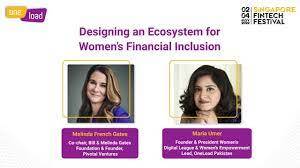
Maria is the founder and president of Women's Digital League (WDL) - a social enterprise founded in 2009 with the aim to provide digital literacy training and work to Pakistani women. She has been working in the online digital outsourcing sphere for more than 9 years.
Project Artemis/Goldman Sachs 10,000 Women Program was the turning point in her career. Getting to the finale of GIST's (www.gist.crdfglobal.org) "I Dare" business plan competition was another huge encouragement. Google Pakistan profiled WDL in its online campaign showcasing innovation in the use of technology.
Stemming from her passion for economic empowerment of women, she has also served as the Project Manager for WomenX, a World Bank supported training program for women in business.
In a fireside chat with Melidan French Gates, Maria Umar discussed on how how OneLoad is playing a pivotal role in creating an ecosystem for female inclusion.
https://www.youtube.com/watch?v=pG87uSUR6fI
"The fireside chat was part of the Singapore Fintech Festival. We talked about financial inclusion and how being gender intentional made for a good business strategy because any business that did not make a conscious effort to include 50% of the population was a bad business. 91% of Pakistanis are unbanked and majority of them are women. So fintechs have a role to play here in bridging the gap between the unbanked and institutes providing financial services," explained Umar.
"Covid really showed us the need and importance of digital skills from the most basic to more complex. The privileged 9% of Pakistanis that have bank accounts also had a learning curve adopting digital financial apps. From Groceries to medical supplies and utility bill payments everything was being done through the online medium. Those that weren't in the banked net had to take bigger risks going to physical locations for tasks that could easily be performed online and hence exposing themselves to the virus. Again, it was the women that suffered the most as their access to digital mediums and skills was limited. With so many fintechs coming out and banks closing branches to go digital unless conscious efforts are made to impart digital skills to women and give them accessibility our already weak economy will find itself in a worse position."

